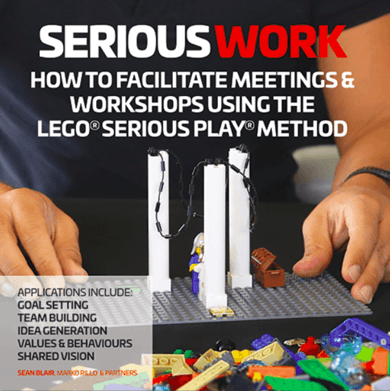Flow + Metaphor in 2 hours?
- This topic has 8 replies, 6 voices, and was last updated 8 years, 4 months ago by
 Stephen Dann.
Stephen Dann.
-
AuthorPosts
-
April 6, 2015 at 5:15 pm #5042
 Jeff TagleMember
Jeff TagleMemberHello everyone!
I am going to demo LSP to my team tomorrow in hopes of getting accredited in the near future. I was given 2 hours to do it and I was wondering if it would be enough to:
A) Warm them Up and acclimatize them into brick building
B) Get them into the Flow
C) Be able to use metaphors instead of trying to be “literal” in their builds.Here are the exercises that I’ve lined up. Please do give your thoughts if they are too easy or too hard.
1) Build a Tower
2) Build a Duck with 7 bricks (then remove 3 and explain how it is still a duck)
3) Build anything, then facilitator assigns story
4) How they perceive the team now
5) How they want the team to be in the future (individual then shared)If the team gets to experience the power of LSP, we may be able to hold an accreditation here, which will be the first in our country.
Thanks in advance everyone!
April 7, 2015 at 2:54 pm #5053 Massimo MercuriMember
Massimo MercuriMembermmmmmm … thinking …. the Duck exercise is adding time but little meaning. The duck in itself is a stand-alone demo and does not mix well with others … I would remove #2, then move #3 to #2, and then add new #3, to build their own personal “superpower”.
That way they are still doing skill building but they are also sharing their own personal reason to exist. It always works (basically replaces the “mother in law” that in this case would be a waste of time)Danger: If you want to do the future view and then also the shared model, you will run out of time immediately, and the participants will not be able to capture any learning, so the whole experience degrades. Be careful. More games does not mean better quality, nor content. You need to let them enjoy what they learn, or they will lose the flow effect. With two hours I would not attempt to make also a shared model. Stay with the personal future view better.
I would add the Simple Guiding Principles at the end, because it is a very powerful exercise. in this case if you can simply make them build one “golden rule” for success of the team. I have observed they tend to understand the concept of Golden Rule much better that Simple Guiding Principles, it’s just a matter of language, they mean the same but are better understood :) And have them ranking them with the 3 bricks. It is always an eye-opener for the team, specially because almost always there is one or two models that get no votes. AND the team can actually use the outcome in their daily strategy.
Anyhow this is just my point of view, remember that what works is what you feel most comfortable with :-)
if you wish, I have a two hour script that we did with 20 people in two tables for a two-team collaboration project kickoff. The participants and the project manager gave excellent feedback on how the session positively impacted the project outcome.
April 7, 2015 at 3:28 pm #5055 GabrielParticipant
GabrielParticipantHello Jeff,
I support 100% Massimo’s suggestions as in my last workshop I made the mistake of underestimating the time it takes for just the skills building. Remember that the time you allocate is a factor of the # of exercises, the time you give them to build, the time you give them to share, the time for reflection, and of course the # of participants…
Good luck…
April 7, 2015 at 6:45 pm #5056 Hector Fabio HernandezMember
Hector Fabio HernandezMemberDear Jeff,
I also agree with Massimo and Gabriel that your design sounds to ambitious for two hours. My comment might arrive too late as I undertand your workshop is sometime today. However, in my experience when you budget the time you need to keep in mind that the sharing usually takes anywhere from 1 to 3 minutes per participant. If you have let say 8 people, you need to allocate at least 15 to 20 minutes their sharing of each model. If you skip this part or don`t give it enough time to each person to share their model you might be taking away a critical step of the method. Good luck.
April 8, 2015 at 4:12 am #5058 Jeff TagleMember
Jeff TagleMemberHello everyone!
Was done with the demo before I got back to the thread, but I appreciate the feedback Massimo, Gabriel, and Hector! I’d like to share what happened:
1) As mentioned, I ended up exercise no. 3. fortunately, they got the hang of building and getting into the flow fairly quickly, even for those who were intimidated with the bricks on the table
2) even though we started late (30 mins to be exact), we actually extended the session by an hour and they didn’t mind. Ideally this shouldn’t happen but lucky me, yeah?
3) appreciation of the LSP process was high. we’re now looking for ways to get the buy-ins of our management committee so we could finally get accredited.
@Massimo will be sending you a separate message re: 2-hour script :)Thanks again everyone!
January 23, 2017 at 10:38 am #8314 Mark MatlockParticipant
Mark MatlockParticipantGreetings Massimo (et al),
I am working on a 2.5 hour LSP session for my org and saw in a thread you had a script that might offer some wisdom. If you are willing to share I would appreciate learning from you how you handled LSP in such a tight window of time
Many thanks!
Mark
January 25, 2017 at 1:31 am #8337 Stephen DannParticipant
Stephen DannParticipantI’ve been running LSP sessions on a two hour window – using the first “half” as a skills training, (construction, metaphor, story making), and then using a custom piece for the second “half”. The current custom piece is a “Past, Future, Present” make a model in 3 minutes (done three times), then explain the combined three piece model to the other participants. Given I use this as a projecting exercise, I get my participants to write on a sticky note a keyword/phrase for each section, and that becomes their take home evidence of play, participation and flow.
The notion of “half” is relative – up to 90 minutes of the first “half” can be necessary to get people to the confidence to produce 3 builds in 3 sequences in 10 minutes.Biggest thing I did with the cutdowns was took out the bulk of theory, and explained the concepts as people did other things, like packed down models, or unboxed their lego. Got to speak a little louder over the sound of bricks, but it seems effective so far.
January 25, 2017 at 1:49 am #8342 Mark MatlockParticipant
Mark MatlockParticipantThank you Stephen,
This is very affirming. I agree that the basic skills actually accelerates later builds. I’ve seen some try to skip it thinking they’ll jump to the good stuff, but it seldom happens without the orientation.
What size kits are you using? I’m thinking I can do the orientation, individual build and then group build off the windows explorer kits.
M
January 25, 2017 at 5:20 am #8343 Stephen DannParticipant
Stephen DannParticipantI’m using the Starter Kits for the sessions. I’ve been avoiding group builds with those kits because of the nightmares I have about splitting the 291 pieces back out at the end. (I have 11 kits. One kit is missing a 1×1 round piece. I am dreading looking through all kits to find it). I also emphasize to my cohorts that that for group builds, you need three hours, so if they’ve had fun, then they can come back to a three hour or longer session.
The thing with the skills building exercises is that they do sit nicely in standard, and can be massaged into providing added meaningful outcome. Bridge/Tower goes from ice breaker “Hi, I’m X from {Y}” becomes “I’m X from Y and my model represents that I want to achieve {A} outcome today”
-
AuthorPosts
- You must be logged in to reply to this topic.

 Become a LEGO Serious Play facilitator - check one of the upcoming training events!
Become a LEGO Serious Play facilitator - check one of the upcoming training events!